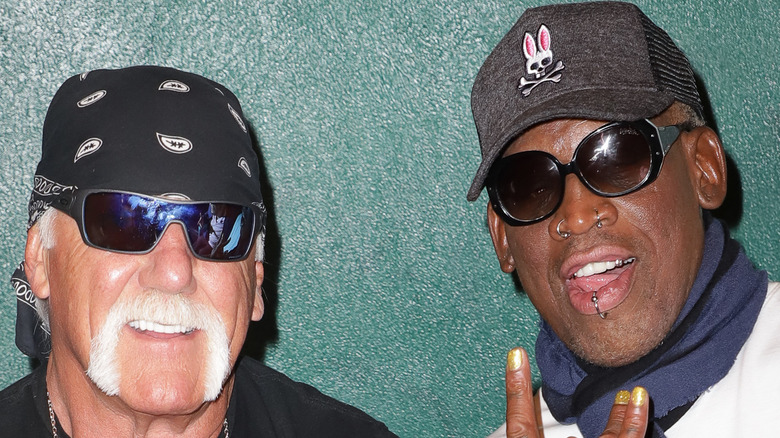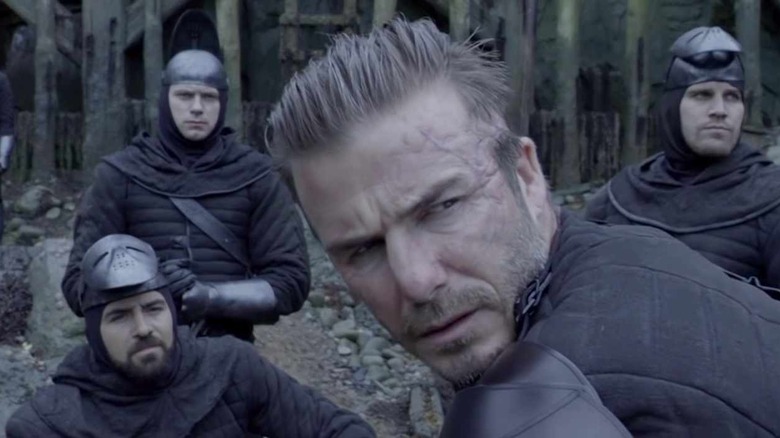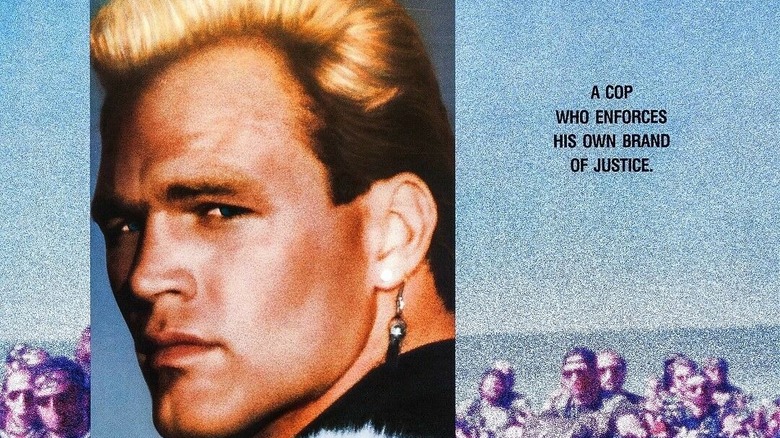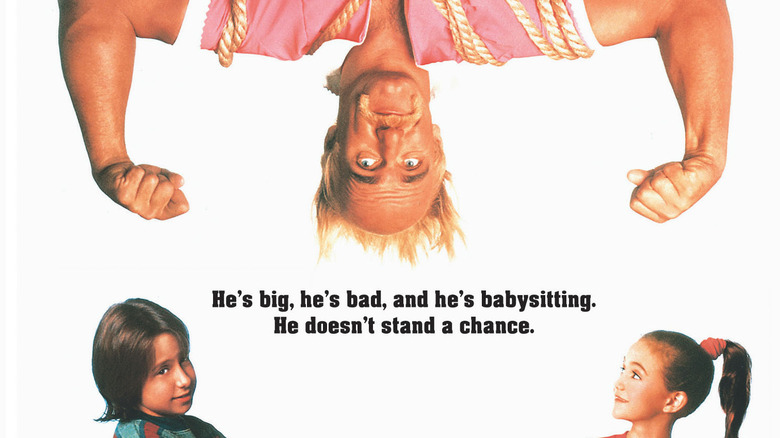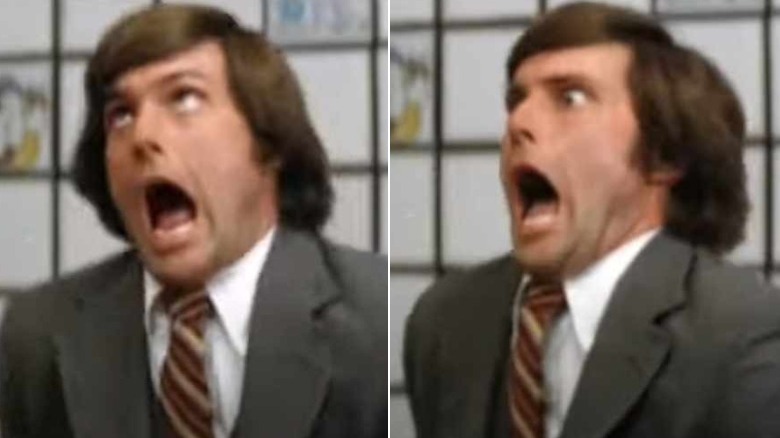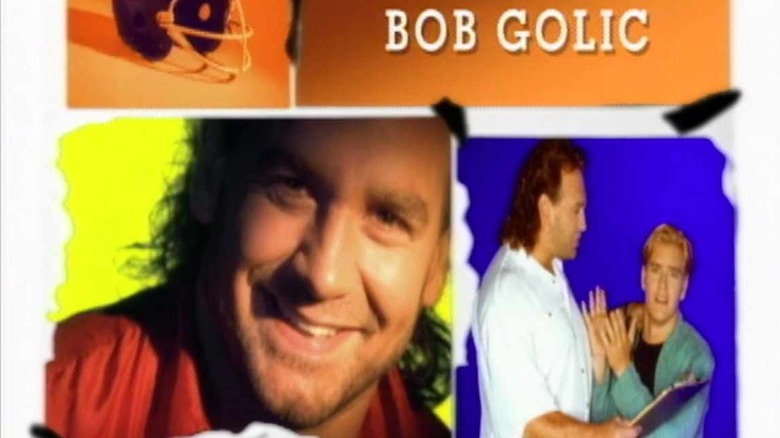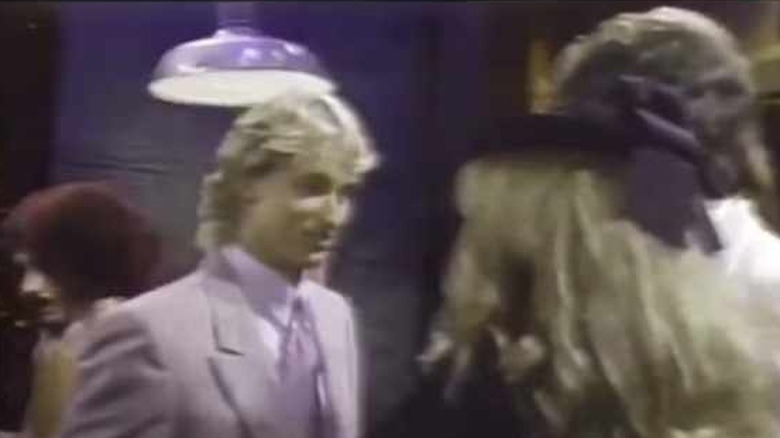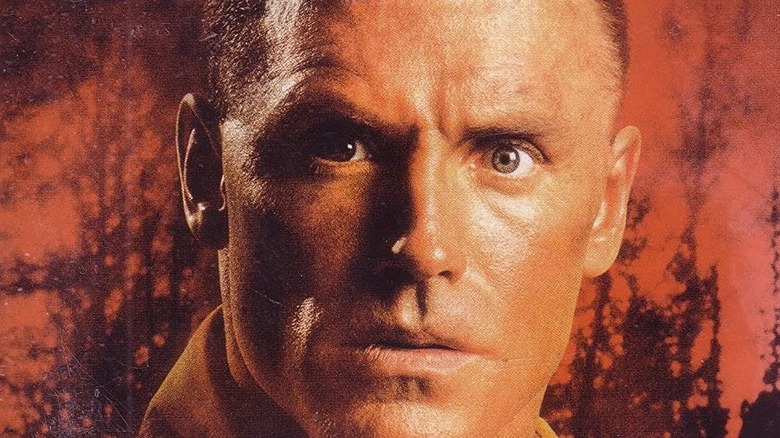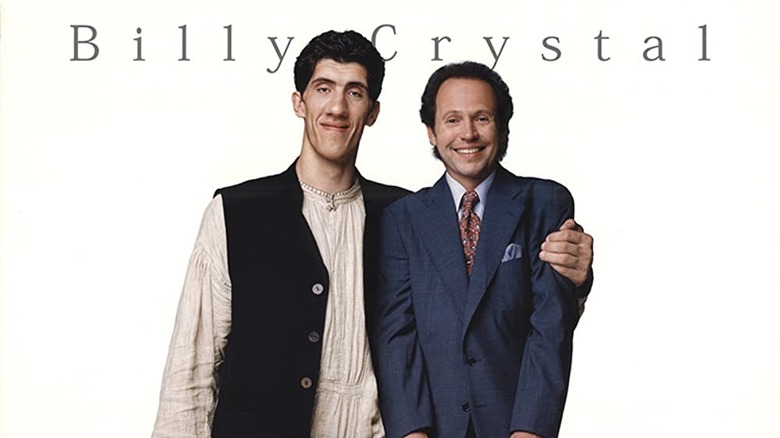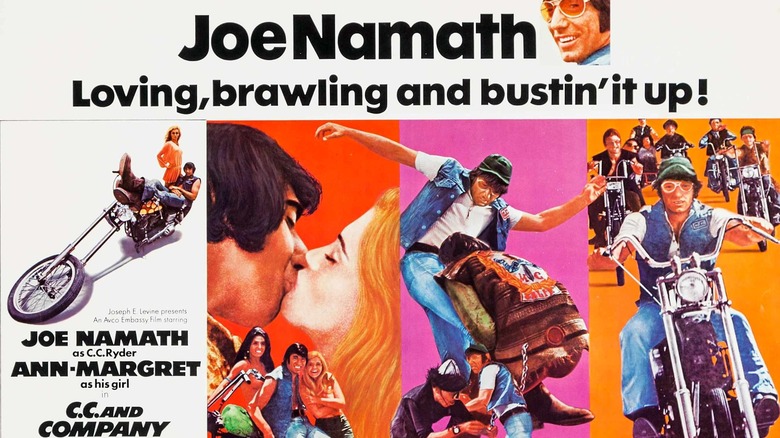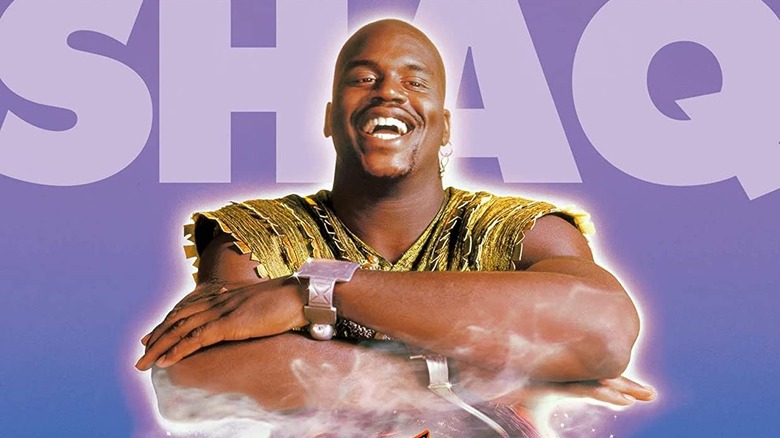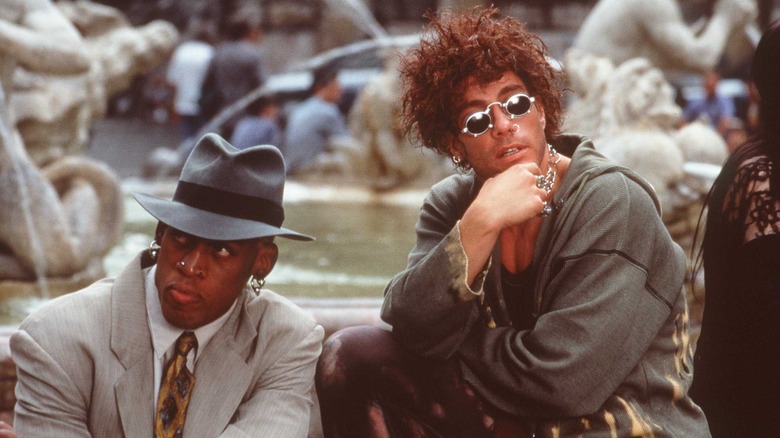Athletes That Tried To Break Into Acting And Failed Miserably
We may receive a commission on purchases made from links.
Since the advent of the superstar athlete in the early 20th century, many have felt the need for a solid second act between (and after) those days of competition. Whether it's Babe Ruth playing himself in 1932's "Perfect Control," Joe DiMaggio selling coffee, Esther William responding to a WWII cancellation ruining her Olympic swimming dreams by heading to Hollywood, or legends (like Jackie Robinson, Andre the Giant, Jim Brown and Michael Jordan, Reggie Jackson and Kareem Abdul-Jabbar) and less-than-legends (like Bob Uecker and Jim Bouton) sticking the landing in an iconic project, many have hoped to capitalize on their fame and star wattage to shine bright under a different spotlight – that of Hollywood.
But for every success story (like Johnny Weismuller, Arnold Schwarzenegger, Sonja Henie, and Dwayne "The Rock" Johnson), there have been multiple athletes who have fouled out of the thespian game. These athletes knew the risks involved when stepping out of bounds, such as David Beckham, who admitted in 2015 that he was "very aware that many sportsmen and other celebrities have turned their hand to acting and failed" as he prepared a small role in the eventual box-office flop "King Arthur: Legend of the Sword."
Examining these more memorable (or forgettable) attempts at taking Tinseltown, patterns emerge about accepting roles that play to your personality strengths, surrounding yourself with good behind-the-camera talent, and having a willingness to laugh at one's own image. Below is a list of hall of famers turned hall of shamers, and why they'd love a mulligan.
David Beckham
Many football (soccer) fans have gotten a kick out of English superstar David Beckham, who has won various championship titles in leagues across the globe. He was also a hit off the pitch, with his matinee idol looks lending themselves to modeling and product endorsements, and even landing himself a Spice Girl as his wife: Posh. When he made his way across the pond to play for MLS' L.A. Galaxy squad, there were bigger games planned with specific goals in play. An anonymous Hollywood executive told The Times in 2006, "If Daniel Craig does not work out as 007, Beckham could be ready to step into his shoes, the next blond Bond."
While his surname graced the 2002 indie hit "Bend it Like Beckham," his full name hasn't exactly hit the mark in the film and TV industry, outside of playing himself. So, although Craig's Bond days seem to be over, don't expect Beckham to be shaking and/or stirring any time soon.
He told ABC that acting wasn't a new career, but something he's "enjoying himself with." Guy Ritchie gave him two glorified cameo roles, in 2015's "The Man from U.N.C.L.E.," and two years later with the aforementioned "Arthur" flick. Beckham said that Ritchie "wouldn't put me in a film if he thought it was going to ruin it." Box office and critics didn't seem to agree, with his part in "Arthur" labeled by Empire as a "misguided, fist-biter of a performance," and The Telegraph noting that it "shows just about enough dramatic range to have played the stone the sword got stuck in." Being a well known public figure, Beckham is "used to criticism," and always game to poke fun at his own image.
Brian Bosworth
Perhaps no one made a scene or brought more attitude to the college football field in the mid-1980s than Brian "The Boz" Bosworth did. Steroid controversy hurt his NFL draft status, but in 1987, the Seattle Seahawks signed him to the largest rookie contract ever at the time. Three years later he was out of the league due to injuries, which had the hometown paper ranting that Bosworth "was every fad that never lasted. He was the lambada of linebackers... a fraud, a lemon, a jerk, a 245-pound mouth."
Luckily, the Land of Boz was ready to move on to his next career, writing in the last page of his biography: "reading scripts and walking to the mailbox for royalty checks ... I'll see you at the movies. I'll be the one in the Ferrari, laughing my ass off and riding into the sunset with the beautiful babe."
While his agent proclaimed him to be the "Brando of the '90s," the would-be-actor didn't "expect to be a comedy star ... Tom Hanks is safe for now." 1991's undercover cop actioner "Stone Cold" was supposed to be his big breakout, but was dead on arrival (with "What About Bob?" being the bigger draw). The critics weren't kind either, including the star's own take four years later, with Bosworth saying, "it was a meathead action genre movie ... I wouldn't go see that movie."
While the Razzie Award nominee has since popped up in smaller roles in such films as "Three Kings," "The Longest Yard" and faith based movies, he added, "I really don't want to be famous again." However, he was an inspiration for Cameron Crowe's "Jerry Maguire," and his house was used as a filming location on "The O.C."
Hulk Hogan
Just before he became a household name for his theatrics and nearly-unrivaled charisma in the wrestling ring, Hulk Hogan (aka Terry Eugene Bollea) almost went the distance as the "grotesquely macho" Thunderlips in a "Rocky III" supporting role. Hogan would go on to be a 12-time world champion between the WWF/WWE and WCW, launch a sea of endless merchandise, a patriotic anthem, a Saturday morning cartoon, and naturally go Hollywood. Hoping to cash in on the devotion of his Hulkamaniacs, the Hulkster was elevated to leading man, but attempt after attempt to be a box office champion didn't seem to earn him any belts.
Hulk was in his comfort zone for 1989's "No Holds Barred," a WWF-produced clunker whose reviews weren't so comforting (although it did open in second place at the box office, behind "Indiana Jones and the Last Crusade"), with one saying his "big-scream debut ... performance is as dreadful as one might expect."
Two years later he slummed it up in "Suburban Commando," which led Roger Ebert to say something out of character after seeing it: "I was feeling kind of tired of going to the movies." It didn't get better, as the scripts only seemed to get worse ("Mr. Nanny") and closer to straight-to-video status ("Santa With Muscles," considered one of the worst Christmas movies ever). He did get a backhanded compliment from the New York Times when they said his "touching performance" in 1998's "Three Ninjas High Noon at Mega Mountain" marked the high point for the "sad state" of that movie.
Hogan did become a star outside the ring eventually, but for unintended reasons; when Gawker posted a sex tape of Hogan, it set off a fierce debate and trial over freedom of speech and the press that would eventually lead to the site's demise.
Bruce / Caitlyn Jenner
The long journey of fame, notoriety, infamy and politics for Caitlyn (née Bruce) Jenner began when she was the gold medal winner in the men's decathlon at the 1976 Summer Olympics in Montreal. Jenner's golden boy looks and bright smile made him ripe to be a personality on TV, and he made the rounds on the tube as a sports commentator, host, frequent talk show guest, and fitness guru. He would later drop in on shows like "The Fall Guy," "Silver Spoons," "The Love Boat" and as a possible Erik Estrada replacement on "CHiPs."
Film work beckoned, and his first (and basically only) feature cast Jenner as a straight-laced guy cutting loose alongside Steve Guttenberg, Valerie Perrine and the macho men Village People in 1980's "Can't Stop The Music." While Jenner claimed the film was "big in Europe," it was a big flop in America, as disco was concurrently dying a fast death. One critic remarked that the romantic screen pairing of Jenner and Perrine "got laughed at more than with," although there's no denying that the "Y.M.C.A" sequence is Busby Berkeley-level genius.
Jenner later added his own two cents in his 1996 autobiography, saying the people had spoken. "You can't sell a ticket if the interest [in me] is gone ... Now I was stuck voicing the lines of a polyester-suited lawyer, who was everything that I wasn't. Swept up in Hollywood, I had somehow been swept off the course of my dream."
Jenner went on to help define a generation of reality TV with "Keeping Up With The Kardashians", transitioned into being a woman, ran for governor of California, and recently became a commentator on Fox News.
Bob Golic
Cleveland native Bob Golic was a middle linebacker on Notre Dame's 1977 national championship football team, and went on to have a respectable NFL career. During the off seasons, he kept an eye out for a post-playing career as an actor, landing bit parts on shows like "Coach," "Good Advice" and the 1991 Ken Wahl vehicle, "The Taking of Beverly Hills." At the time, Golic sarcastically said, "They needed a guy who looked like a football player ... so I had to stretch to get into that character. They asked me to act like I'd had a few beers. I'm thinking, 'Wow, I don't know if I can do this.'"
When he officially hung up his cleats in 1993, he already had his next gig lined up, but sadly, not in the movie about his former inspiring Fighting Irish teammate, Rudy Ruettiger, jokingly saying "I can't even get a role to play myself." Instead, his first big role was as a hard-nosed dorm resident advisor to Zack Morris, A.C. Slater and Screech on the turkey of a prime-time NBC show "Saved By The Bell: The College Years." Golic was the first to admit he "wasn't DeNiro," but even if "College Years" had starred DeNiro, it likely wouldn't have avoided scathing reviews saying "the grade average's pretty low," "overflowing with insipid sitcom foolishness," and "hands-down stupidest, least worthwhile series on prime-time TV."
After the show was canceled following a single season, Golic made only two TV subsequent show appearances ("Dave's World" and "Charlie Grace") and graced the 1997 movie "Dreamboat." He has since retreated from Hollywood to become a talk radio host back home in Ohio.
Wayne Gretzky
There is only one athlete referred to as "The Great One," and rightfully so, as hockey superstar Wayne Gretzky won four Stanley Cups, holds a plethora of NHL scoring records, was an instant Hall of Fame inductee, and the first ever player to have a number, his iconic 99, retired by the NHL league wide.
When Gretzky tried his hand at acting, however, he earned a penalty for unsportsmanlike conduct. He let his hair down and donned a sharp suit to play a gangster thug on the soap opera "The Young & The Restless." One reviewer likened it to "casting Woody Allen as Attila the Hun," suggesting he stick with commercials. Gretzky later admitted that he "was horrendous. I was worse than bad. I scarred myself for life."
When he was traded to the Los Angeles Kings, many assumed he would jump into other parts of the entertainment industry, but he told Conan O'Brien that "[I] never wanted to act. I wanted to be a hockey player." As an ambassador to the game, he popularized hockey to a greater extent in America, and was even amazed at seeing kids play "roller hockey in Beverly Hills." While he turned down an offer to host "Saturday Night Live," his wife, actress Janet Jones, went behind his back and drafted him to do so, appearing on the May 13, 1989 episode (alongside fellow hometowner Phil Hartman), and admitted it was "one of the greatest thrills of my life." Perhaps best suited to being The Great One, and not someone else, he has appeared as himself in "D2: The Mighty Ducks," "The Simpsons," and music videos for MC Hammer and Nickelback.
Howie Long
NFL Defense End Howie Long had a commitment to excellence playing for and winning the Super Bowl with the Oakland/Los Angeles Raiders, and later was enshrined in the Football Hall of Fame for his efforts. Some saw him as the next Schwarzenegger, and he considered acting, but wasn't "interested in doing a shimmering moonlight through the Venetian blinds sweaty bodies type of movie, I just want to blow stuff up." Long slid easily into his next role, working for Fox Sports as a commentator, where owner Rupert Murdoch spotted him and fashioned him an action star. Long said, "When Rupert calls, you take the meeting." That landed him in the 1996 John Travolta nuclear picture "Broken Arrow," which had director John Woo expanding his part and telling him he was the next John Wayne.
Two years later, Long was the draw, tackling the incandescent "Firestorm," but he was more like John D'oh than John Wayne, proving he couldn't carry a torch or a picture. Long had said that he tends "to be my own worst critic. I don't need a lot of criticism from other people because I get enough from myself," but not sure if he had said such things about his own performance like "almost a complete zero as a screen presence," and "as a football player, Long did a better job tackling runners than dialogue." No harm, no foul, as he once said that if his film career "ended tomorrow, I've had the [kind of] life that people could only dream about."
Long went on to become one of many entertaining elements in the underrated 2001 action flick "3000 Miles to Graceland," but his greatest performances (and likely most lucrative) have come in a series of ongoing Skechers ads, as well as a ubiquitous Radio Shack campaign that had him and Teri Hatcher (possibly? maybe?) playing a couple (or themselves?) in what felt like every other commercial airing in the early '00s. Long did go on to win an Emmy ... for Outstanding Studio Analyst in 1997, and continues to appear on TVs every football Sunday.
Gheorghe Mureșan
Suffering from a rare disease called acromegaly, Gheorghe Mureșan had an overgrowth of growth hormones, and grew to be 7 foot and 7 inches tall. The Romanian made the most of his height advantage and eventually played in the NBA, where he led the league in field goal percentage in the 1996-97 season (naturally wearing jersey number 77). He was a good sport off the court too, even putting on a funny face, shilling for Snickers, dancing, dining and piñata smashing for ESPN, and playing the ventriloquist to the dummy of Eminem in the "My Name Is" video.
After closely working with Andre the Giant on "The Princess Bride," co-star Billy Crystal came up with the movie concept for what became 1998's "My Giant." Andre died three years prior, so Crystal turned to the "vulnerable and charming" Mureșan to fill those big shoes. For the "comedy of incredible proportions" (co-starring Steven Seagal) not many people were laughing, with the Washington Post denigrating it a "fe, fi, fo, flop!" and CNN knocking the ballplayer as "a limited performer. He also speaks as if he's storing potatoes in his cheeks for the oncoming Romanian winter." Mureșan (who apparently has never seen the finished film) didn't seem to mind, telling Knight Ridder, "people laugh. I'm glad. People who laugh at me in the movie laugh at me on the street too." When David Letterman asked him if he wanted to act more, he replied, "Playing basketball is my life. I want to work with kids," and that's exactly what he has done since with his Giant Basketball Academy.
Joe Namath
Joe Namath was a press-savvy quarterback with a knowing smile for the New York Jets, and delivered on his "guarantee" to slay the heavily favored Baltimore Colts in Super Bowl III. Nicknamed "Broadway Joe," Namath was eager to take his talents to other venues, where the cheers typically came at the end. He tried many, many, many attempts at acting on screens small and large, and on stages too, but was never able to "guarantee" the kindest of words about his performances.
In the 1970 easy riding "C.C. & Company" biker flick, Namath proved he could make a sandwich, but critics said "he's not much of an actor," only looking comfortable in the love scenes he shared with Ann-Margret (Quentin Tarantino was apparently such a fan that he included it in "Once Upon a Time in... Hollywood"). The uncivil picture that followed a year later, "The Last Rebel," was called "Namath-oriented stupidity." A theater review's scouting report said he "can't sing. can't dance... might do for dinner theater." When he quarterbacked the ratings-challenged 1978 sitcom "The Waverly Wonders," it got sacked a month after its debut, and replaced at NBC by a little show called "Diff'rent Strokes."
Namath gained a strange distinction around this time, being the only sports figure to appear on Richard Nixon's enemy list. Still, Namath soldiered on, saying in 1985 that with acting, "I've grown with it. I love it. It's fun."
Shaquille O'Neal
As a four time NBA champ and one time MVP, Shaquille O'Neal was one of the biggest big men to make a large imprint on the game. And yet basketball wasn't the only medium "Shaq" was looking to put a slam dunk on. He gave hip-hop a try, even had his own video game, and had his own Hollywood dreams, in movies with lots of blowing up, lots of action, lots of fighting. Not that many words." Portraying a basketball player in William Friedkin's 1994 film "Blue Chips" was "pretty easy" for the budding actor, but he found further progress as difficult as making a free throw.
He was the center of attention as the titular genie in 1996's "Kazaam," which left one reviewer hoping that "one of his three wishes includes an all-expense-paid acting coach." At the time, Shaq was none too pleased with the criticism, saying "I took a lot of heat from old guys like Siskel and Ebert," but later claimed in 2016 that he "was forced to do that movie," while admitting it was "awful." He might be off the hook, however, because today the Mandela Effect has many people thinking the film starred Sinbad.
His follow-up, the superhero flick "Steel" didn't impress anyone either, and couldn't even conquer week 3 of "Air Bud" in theaters. The director, Kenneth Johnson, told Vice in 2017 that "[Shaq] is no movie star," which didn't help matters.
O'Neal has gone on to a fruitful career as a commentator and appearing as himself in various films and TV shows, and on the West Coast his work with "The General" is a staple of daytime television. But one has to wonder about the role he turned down ... which earned Michael Clarke Duncan an Academy Award nomination: "the down-South African American guy during slavery," John Coffey in "The Green Mile."
"I think I made the right decision because he did way better than I could have done," Shaq revealed in 2021. "But I got offered that role."
Dennis Rodman
Dennis Rodman had a flair for the dramatic, eccentric and bizarre in a hall of fame career where he helped the Detroit Pistons' "Bad Boys" to two NBA Championships, and later assisted Michael Jordan and the Chicago Bulls threepeat on trophies. Rodman, also known as The Worm, stretched his outsized personality far beyond the court too, dating superstars and supermodels, penning books with titles like "Bad As I Wanna Be," and jumping at the shot for movie stardom. He told The Times, "I act every day. I act on the basketball floor, I act at home, I act making love. You name it."
After a handful of cameos in films as his "bad" self, he was paired with Jean-Claude Van Damme to play an arms dealer in 1997's "Double Team," which didn't translate to double the pleasure. Rodman rated his debut as "a B-minus," but that was being generous, as he went on to win three Razzie awards (a year after attending the Academy Awards) for Worst Supporting Actor, Worst New Star, and Worst Screen Couple (with Van Damme). Round two at the cineplex didn't fare much better, portraying an Interpol agent in 1999's "Simon Sez," which lasted 2 weeks in theaters and helped him to earn a fresh Razzie nomination as Worst New Star of the Decade (losing out to Pauly Shore).
He has since gone back to playing himself in cameos and acting as a peaceful envoy to thaw relations with North Korea. Before her death, director Penny Marshall was working on a documentary about his life; it remains to be seen whether that project will ever be finalized.
